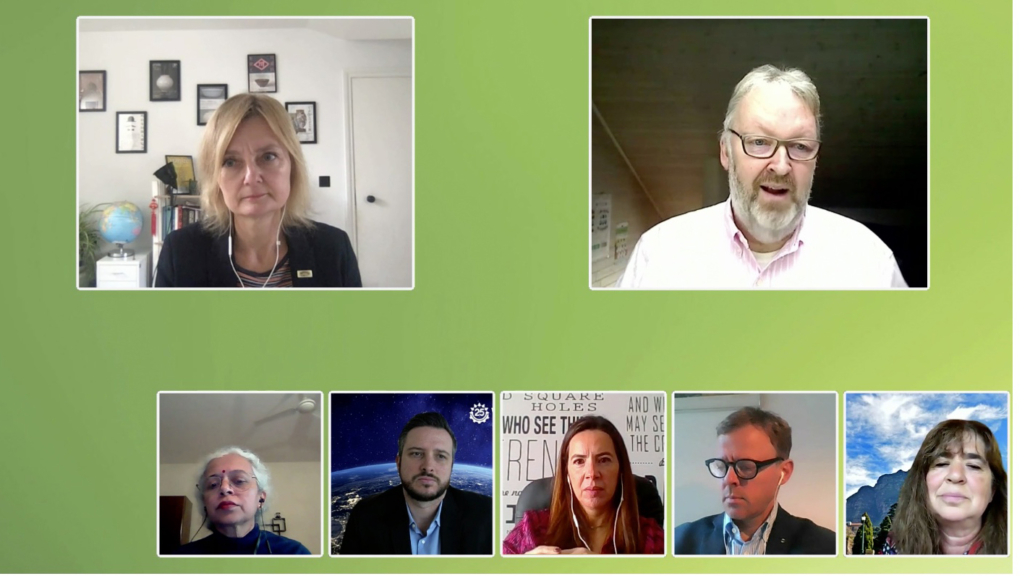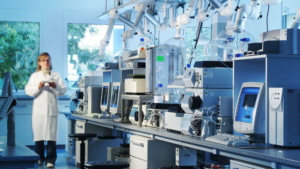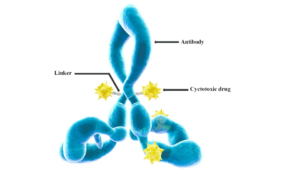
3,000+ experts discuss bioeconomy globally
More than 3,000 attendees are participating in the Global Bioeconomy Summit, currently taking place virtually until 20th November. Today, the plenary program and the livestream of the conference kicked-off.
5 plenary sessions, 12 interactive workshops, 100+ high-level speakers
With five plenary sessions and 12 interactive workshops, the conference covers a broad spectrum of discussions within the bioeconomy. For the first time, the IAC on Global Bioeconomy welcomes official partners from each continental region to strengthen the international character of the GBS. They are representing Japan, the ASEAN region, Eastern Africa, the European Union, and Latin America & the Caribbean. More than 100 top-class speakers are taking part to discuss, among others, the bioeconomy’s role of solving global crises and effects of the corona crisis towards a sustainable bioeconomy as new economic strategy that stabilizes global economies. In the wake of pandemic, the global bioeconomy community will virtually come together for GBS2020 to explore uncharted territory and advance our sustainable development, Morakot Tanticharoen, Senior Advisor to the President of the National Science and Technology Development Agency Thailand (NSTDA). That Europe is willing to play its part in further establishing a biobased economy, is underlined by Peter Wehrheim, Head of Unit for the Bioeconomy and Food System at the European Commission: By scaling up its bioeconomy, the EU can become the first climate-neutral continent: I look forward to see many concrete best practice solutions for climate mitigation at this year’s Global Bioeconomy Summit.
However, speakers will not only refer to economy-driven potentials, but also will include social perspectives. The transition towards bio-based economies is not only about production but also about sustainable consumption. GBS2020 covers both sides of the equation and brings together experts from around the world to discuss regional differences in lifestyle and culture, says Torfi Jóhannesson, Senior Adviser at the Nordic Council of Ministers. Top-class researchers such as Mary Maxon, Associate Laboratory Director for Biosciences, Lawrence Berkeley National Laboratory, will also contribute to the GBS. A vibrant bioeconomy is economic activity that is reinforced by the safe, secure, ethical and reciprocal use of biological data, as well as by international standards and norms in research and business operations, she says.
The Council appeals to policymakers to strengthen bioeconomy development worldwide, in particular to exploit the potential of life sciences and digitization and linking them. They argue that promotion of jobs in the bioeconomy is an opportunity that needs new educational programs. Further priorities are the mobilization of financial resources for the development of the bioeconomy, more involvement of industry and business, resilient chains, and to involve consumers much more closely through information and incentives. The Council is convinced that the Bioeconomy Summit should continue to be held every two years
Global expert survey and policy report results
Interactive workshop program for three days
What is being worked on in all parts of the world in order to bring a sustainable bioeconomy into everyday life and how diverse experts are dealing with bioeconomy, innovation and sustainability could be seen during the 12 interactive workshops that happened during the first three days of the GBS from 16th to 18th November. In order to strengthen the international exchange, the international organizing committee of the GBS invited many partners from all five continents of the world to take part in the organization of the workshops. In the series of workshops called Regional Bioeconomies and Global Cooperation, examples of regional bioeconomies in different parts of the world were presented. Using best practice examples, the actors tried to show how different situations and framework conditions can be for the development of a sustainable bioeconomy. Especially at the regional level there are many different starting conditions and requirements for using natural resources, setting up bio-based industrial processes or implementing political bioeconomy strategies. The summit helped bringing stakeholders together and initiated a mutual learning process.
Industry, policy and science expertise represented
- Emily Chew, Global Head of Sustainability for Investment Management at Morgan Stanley
- Ray Dhirani, Head of Sustainable Finance, WWF-UK
- Agnes Matilda Kalibata, President of the Alliance for a Green Revolution in Africa (AGRA)
- Anja Karliczek, German Federal Minister for Education and Research
- Julia Klöckner, German Federal Minister of Food and Agriculture
- Emily LeProust, CEO, Co-founder and Director of Twist Bioscience
- Ipshita Mandal-Johnson, Global Bio Fund
- Frank Rijsberman, Director-General of the Global Green Growth Institute (GGGI)
- Jeffrey Sachs, Director of the Center for Sustainable Development at Columbia University
- Hiroyuki Kojima, Chief Innovation Officer, Ajinomoto Co., Inc
- Elspeth MacRae, Steering Group Member, IAC | Chief Innovation and Science Officer, SCION
- Marcus Remmers, Chief Technology Officer, Royal DSM
- Virgilio Mauricio Viana, Director General of the Sustainable Amazon Foundation (FAS)
- Brendan Edgerton, Director, Circular Economy at World Business Council for Sustainable Development
- Louise Fresco, President, Wageningen University
- Mary Maxon, Steering Group Member, IAC | Associate Laboratory Director for Biosciences, Lawrence Berkeley National Laboratory
- Michal Devir, Co-Founder and General Managing Partner at Rimonim Agro VC
Virtual exhibition on bioeconomy
A virtual world exhibition on bioeconomy will show how specific products can contribute to global sustainability goals. There is also a media corner again with books, games, teaching material and graphic novels on the subject of bioeconomy. In addition, GBS participants from all over the world present video clips about projects or ventures – from start-ups to large corporations.
Evening reception with food start-ups and guided tours in natural history museums
And the GBS participants don’t have to do without an evening reception either: On 19th November, among other things, they can look forward to a guided virtual tour in natural history museums in Berlin, Germany, and Paris, France. In addition, an innovative bio-based food menu is virtually presented by the food start-ups CellFarm, Knaerzje, Solar Foods and Yolélé. For the first time the "Bioeconomy Youth Champions" will be chosen at the GBS as well. More than one hundred young bioeconomy players from all over the world have applied to take part in this competition, eight of which will be awarded and prepare their own Bioeconomy Roadmap.


 Vetter Pharma
Vetter Pharma International Journal of Molecular Sciences, doi: 10.3390/ijms17040561 JO - s
International Journal of Molecular Sciences, doi: 10.3390/ijms17040561 JO - s